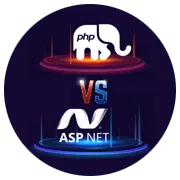
In this competitive market, everyone needs dynamic, eye-catching and user-friendly web application to reach every end of users and increase productivity. That’s why choosing the right scripting language for server-side web application has become a crucial decision for web developers. In the world of web development, the choice of which development language to use commonly comes down to two most prominent, successful and extensively used web programming languages – PHP and ASP.Net
These both scripting languages are heavily weighted, highly dominated and beneficial. These are standard programming languages for developing database-driven websites to interrelating colossally with databases. In this way, it‘s really difficult task to judge and think about the effectiveness of both. Here, we are trying to provide some perspective reasons why one might choose one over the other.
PHP Overview:
PHP is the most popular open source programming language, adapted by small to medium size organizations to build web-sites that rely upon dynamic content. PHP is free and offers numerous frameworks to make web development simple and faster. One of the best things about PHP is that it’s really easy for beginners, yet offers lots of cutting edge features for a professional programmer. At present, millions of websites including WordPress and Facebook written in PHP and providing excellent service without any hassle.
Active Server Pages (ASP) Overview:
ASP.NET is a brainchild of Microsoft, developed for building dynamic, robust, intelligent and scalable websites and internet applications with full featured programming language like C# or VB.NET. It includes a powerful security estimation highlight, as well as an organization gadget that can be used to build up, test, execute and sort out the software. Normally, it is selected for satisfying the needs of large organizations because it reduces the amount of code required to build large applications. At present, most popular eCommerce website Amazon.com, eBay.com are using ASP.NET platform as a framework for their websites and providing outstanding online shopping experience to their customers.
Let’s take a look over comparison of PHP and ASP.Net:
Costs:
While determining cost, we have to consider four most important factors including the cost of the server hardware, operating system, web server, and language/environment itself.
PHP is an open source which is completely free to download as well as upgrades are also free. Moreover, you don’t need to pay any extra licensing cost for having another hot reserve server as a backup, or require running multiple servers for load balancing or server clustering. It can run on Linux based server systems, which are also free open source. It is also fully independent platform so it can be used on any platforms like Windows, Mac, Linux, UNIX, or Linux.
On the other hand, ASP.NET is a Microsoft product, which comes with Windows operating systems. If you want to use addition servers such as Microsoft SQL Server, Microsoft Windows Server, you have to pay extra licensing cost. In addition, users need series Microsoft product like visual studio or dreamweaver for programming, windows for operation system, which make it expensive than PHP language.
Winner: PHP
Scalability:
Both programming language are highly scalable and world’s most popular social networking website –Facebook and MySpace is perfect example for it. FB was built in PHP, while Myspace was built in ASP.NET. Both sites compete with each other. Generally, Application scalability depends on programmers’ experience and their use of programming practices, programming framework and programming guidelines and standards.
Winner: Tie
Performance:
Performance can be difficult to judge; because each language has their particular pros and cons as well as optimization diverse from problem to problem and language to language. Performance is based on application interaction between the script, the database and the server.
PHP is an interpreted language, that means it run directly from the code which you writing every time. Most PHP based application follow the LAMP stack – Linux (OS), Apache (server), MySQL (database) and PHP (scripting language). The LAMP stack is very popular for web development, and therefore, it has been optimized extensively for better performance.
ASP.NET often use MSSQL (MySQL) database, so there is a very little different in the performance. ASP.NET boasts a concept of a whole application, so requests can share memory, caches and configuration between each other in ASP.NET; however with PHP, these things must be re-loaded on every request. So it reduces the performance of any application written in PHP.
Another most essential factor that affects the performance of application is OS and file system used on the server. Most analysis specifies that Linux and ext4 file system have better I/O performance than Windows and the NTFS file system. PHP is running on Linux web host, so you will get better performance than ASP.NET application running on a Windows OS.
Winner: PHP
Support:
Both PHP and ASP.NET Possesses large online community that regularly contributes to web development. PHP is free open source so there is a huge amount of dedicated and friendly developers all over the world who constantly make improvements and updates, and provide support for the platform. Even, PHP community also tends to be very supportive, which is a additional benefit for new comers.
On the other hand, ASP.NET is invention of Microsoft, supported by dedicated engineers who are working on planned improvement and development of the language. So, there is less chances of bug issues. Moreover, Microsoft has a huge customer support base which is committed for trouble shooting issues related to ASP.NET. However, there is less contributors support available so it’s bit difficult to solve all ASP.net challenges.
Winner: PHP
Editors and Tools:
PHP is editor independent and presently most PHP developers prefer text editors like VI, VIM, Notepad rather than full-fledged IDE. These are very advanced and independent editors that becomes helpful to perform very complex programming in a fast, independent and efficient way. Even, users get solid supports in their PHP development with Eclipse editors.
Most of the ASP.NET programmers depend on most powerful, feature-rich and flexible IDEs “Microsoft Visual Studio (Microsoft VS)” to develop robust and scalable .NET applications. However, it is not free, but price doesn’t matter here if you want to develop solid and productive web application very easily and quickly.
Winner: Tie
Ease of learning:
PHP is really easy to learn, so it’s best choice for beginners. They can learn and go with few simple lines of code as well as start developing with wordpress theme almost easy and perfect way. On the other hand, ASP.NET is written C‘Sharp’ (C#) language which is really difficult to learn. Its syntax is also complicated and tricky to read even for experienced programmers. If you are experienced developers, then you definitely want advanced features that you can get only with ASP.NET MVC. For rail developers, it’s really easy to pick ASP.NET than PHP.
Winner: Tie
Language Popularity:
In terms of language popularity PHP is good one. It has obtained 6th ranks in the chart of most popular language, while ASP.net is not even show up in top 20. Recently, you can see the popularity of C# over PHP because C# is a truly multi-purpose language in order that users can use it for web development, embedded development, application development or game development. ASP. NET is written C language although it does not get popularity due to some unwanted features.
Winner: PHP
Time to Deploy:
Generally, ASP.NET takes larger amount of code than PHP to achieve complex features and functionality, this things adding more time to the development process.
PHP is interpreting at the server, so user does not require additional steps for changing functionality. While ASP.net needs to be compiled every time the code is customized. Again, the development process is lengthier when using ASP.net rather than PHP.
Winner: PHP
Conclusion:
It’s really hard to make a generic recommendation because ASP.net and PHP both are flexible. ASP.net is object oriented with task based library while PHP is adaptable. PHP is the best choice for small business owners or new comers who have a limited budget and does not required superb security support in their web application. However, PHP is not for e-commerce application development, so if you are developing website for online business then you should choose ASP.net. PHP has attracted a lot of like-minded developers for developing wealth of open source PHP projects. You can write awesome web applications in these both platforms ASP.NET MVC or PHP, so it’s your own choice with whom you want to go.
Rahul Panchal
Rahul Panchal is the Founder & Managing Director at Rlogical Techsoft Pvt. Ltd. He is a pioneer tech enthusiast who has assisted diverse enterprise solutions with a fresh perspective over the years. From integrating technologies like Full-Stack, .NET, Flutter & PHP, he has harnessed custom web or hybrid mobile app development projects. His creative outlook on the latest models of AI, ML, blockchain, and IoT, has made various businesses attain leading-edge success.
Related Blog
- Java or Dot Net: Which is Better for Web App Development?
- Why is the ASP.NET platform so popular for customized web apps?
- A Comprehensive Guide On Comparing Between .Net Core And .Net Framework!
- .NET Enterprise App Development: 6 Reasons To Choose
- Top 7 Benefits of .NET Framework for Business Application Development
Categories
- All
- Amazon Web Services (AWS)
- ASP.Net Development
- Azure Web App
- Big Data Analytic
- Customize
- Digital Marketing
- Drupal Development
- E-commerce web development
- Education Mobile App Development
- Enterprise Application
- Event Management App Development
- Fintech
- Fitness App Development
- Food Delievery
- Front-End Development
- Healthcare App Development
- Hire Dedicated Developers
- Hotel Booking App
- IT Industry
- JavaScript Development
- Mobile App Development
- On Demand App Development
- On Demand Healthcare App Development
- PHP Development
- POS Software Development
- Real Estate Mobile App Development
- Retail Business App Development
- Salesforce
- Social Media Development
- Software Development
- Technology
- Transportation App Development
- UI/UX Design
- Web Design
- Web Development
- Web Services
- Web/Data Scraping Services
- WordPress



 Rahul Panchal in ASP.Net Development
Rahul Panchal in ASP.Net Development 




